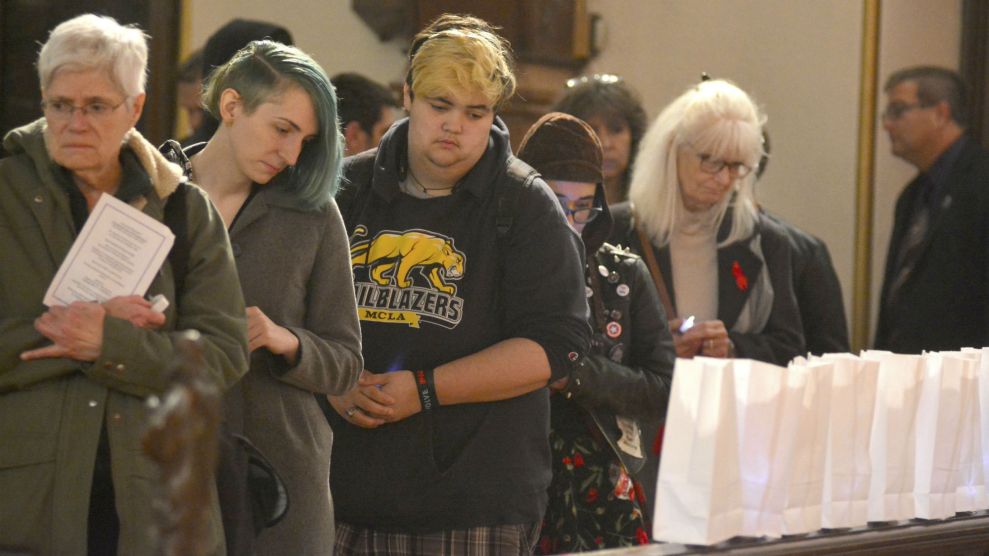
Getty Images
This story was originally published by ProPublica.
Aea Celestice, a black transgender woman living in Jacksonville, Florida, has the most basic of plans for the next chapter of her life: She hopes to get out of town before someone kills her.
Celestice, 32, has good reason to worry. Over the past six months, four black trans women in the city have been shot, three of them fatally.
Celine Walker, 36, was shot to death in her room at an Extended Stay America hotel near the University of North Florida on the night of the Super Bowl, Feb. 4. On June 1, Antonia “Antash’a” English, 38, was killed outside an abandoned home north of downtown. And on June 24, Cathalina James, 24, was gunned down in a room at a Quality Inn on the city’s south side.
The cases have left Celestice and others in Jacksonville’s transgender community rattled, but it’s been the handling of the investigations by authorities that’s stirred outrage. In public statements and official documents, the Jacksonville Sheriff’s Office has repeatedly identified the victims as men, refusing to call them by the names they chose to use in their lives.
While an arrest has been made in the shooting of a 23-year-old trans woman, all three murders remain unsolved, and the insistence on referring to transgender women as men has left Celestice wondering just how much effort is being made to find the killer or killers. She wonders whether anyone outside of her community cares.
“There doesn’t seem to be a concern for anybody,” Celestice said. “I guess other people have other things going on in their lives than being concerned about a trans woman getting murdered.”
Studies show that transgender women are disproportionately likely to be victims of violent crime, not just in Jacksonville, but nationwide. Yet most local law enforcement agencies persist in handling these cases much like the Jacksonville Sheriff’s Office, or JSO.
The transgender community has a word for calling a trans person by the name they no longer use, one that conveys a double meaning when it involves murder. It’s known as “deadnaming.”
Across the nation, ProPublica found, some 65 different law enforcement agencies have investigated murders of transgender people since Jan. 1, 2015. And in 74 of 85 cases, victims were identified by names or genders they had abandoned in their daily lives. Our survey found that arrests have been made in 55 percent of the killings of transgender people nationwide in the last three and a half years. The overall clearance rate for murders in the US is only slightly higher, at 59 percent.
Advocates say that not using the name and pronoun a person was known by can slow down an investigation during its most critical hours. People who knew the victim or who saw them in the hours before they were murdered might only have known them by their preferred name and gender.
“If Susie is murdered, don’t use ‘Sam,'” said Monica Roberts, an activist and journalist who tracks murders of transgender people. Roberts worries that deadnaming both prevents the community from identifying victims and fosters mistrust of police.
Police at the handful of agencies that routinely use victims’ preferred names and pronouns say not doing so can damage the agency’s relationship with the transgender community, or alienate friends and family.
“That might lose the cooperation of the friends and family—the people we need to solve the case,” said Detective Orlando Martinez of the Los Angeles Police Department.
In investigating the murders of Walker, English and James, the Jacksonville Sheriff’s Office says it has just followed its policy, which is to identify people based on a medical examiner’s report and whatever name and sex are listed on their state identification.
After Walker’s death, the sheriff’s office referred to her in reports and public statements as a man and released a male name to the media, one she hadn’t used in years. Friends and activists called the agency, asking officers to respect Walker and use her chosen name, but say they were told that wasn’t how the agency handled such cases.
Bailey Bolden, a transgender woman and friend of Walker’s, said JSO told her the agency can’t assume that a man with breast implants identifies as a woman. Bolden said she viewed both JSO’s refusal to call her friend “she” and her interaction with the agency as deeply disrespectful.
When ProPublica reporters emailed JSO to ask for press releases sent out about James’ murder and referred to her as a transgender woman, public information officer Melissa Bujeda corrected us. “The victim is listed as a male,” she said.
Members of Jacksonville’s LGBT community say investigators have taken a low-key attitude towards a series of murders that should trigger alarm in any city.
Jacksonville is the 12th most populous in the country, with one of the largest police forces. And yet, it is not doing what smaller cities with far fewer resources have done. For example, the New Orleans Police Department sent a liaison to a town hall with the LGBT community within two weeks of two murders of transgender women last year.
It took more than a month after the third murder for the sheriff’s office to hold a public meeting and that gathering came only after sustained pressure from advocates and trans women, including rallies, phone calls, vigils and meetings.
Investigators say they have no evidence the shootings are related. To many in Jacksonville, that misses the point, which is that the attacks have been targeted against a vulnerable group with few defenders.
For Celestice, simply being a black trans woman in the city right now feels unbearable.
“I have to get out of here,” she said. “I have a lot to offer, and it would be a shame if my life was cut short because someone decided that they wanted to kill me.”
Jacksonville is not unique. Transgender people are routinely misidentified by law enforcement officials in cities across the country.
If you watch a 2016 video on her Facebook page, you can see Amia Tyrae swaying to the tune of Beyoncé’s “Freedom.” Her eyelashes are meticulously sculpted and her lips, coated in light pink gloss, shimmer as she looks directly into the camera.
Earlier this year, Tyrae was shot to death at a motel in Baton Rouge. In reports provided to the media, police described Tyrae as a “transvestite”—an anachronistic term now widely considered a slur—and a man.
“It’s like a slap in my face,” said Alexis White, a transgender woman who described herself as Tyrae’s mother. In the transgender community, “mother” is a term of respect and devotion used for elders in the community, who often fill a familial role when people have been estranged from their birth families.
White said that hearing Tyrae described as a man was hurtful.
“Her name was Amia. She was a trans woman,” said White, “She was very sweet. She was loved by many.”
Don Coppola, a spokesperson for the Baton Rouge Police Department, said the department does not have a formal policy on how to identify transgender victims of crimes.
Pushed to explain how the department would refer to a transgender person, Coppola said police would use the person’s sex assigned at birth, noting “if it’s a male, it’s a male.”
Despite her close relationship with Tyrae, White said that the Baton Rouge Police Department never contacted her or other people she knows in the trans community to verify Tyrae’s identity.
When 24-year-old Ty Underwood was gunned down by a football player at Texas College in 2015, police reports initially noted that Underwood, who in Facebook photos has long dark hair and manicured nails, appeared to be female. Despite her appearance, and despite the fact that she had identified as a woman for years, the Tyler Police Department described her as a man throughout police records and in interviews with ProPublica.
In a supplemental police report, a detective noted that “there were no female breast (sic)” on Underwood, and later wrote that “the victim was a male dressed as a woman.” Records also show the Tyler Police Department referred to both Underwood and her friends as transvestites in internal documents describing the murder investigation.
The Dallas Police Department is one of the few local agencies that makes an effort to use preferred names and pronouns in order to build trust with the transgender community.
When Carla Flores-Pavon was found strangled to death in her apartment in Dallas in May 2018, Deputy Chief Thomas Castro of the Dallas police said the department made an effort to refer to her as “she” and “Carla” during their investigation.
“When we go out to the community and talk about somebody, we have to identify them by the way they identified,” Castro said, adding that it wouldn’t do the department any good to use a name that nobody knew her by.
Police who incorrectly describe the gender of murder victims often don’t have internal policies that account for transgender people. Tyler Police Department spokesperson Don Martin defended his department’s decision to call Ty Underwood a man, saying that the department uses whatever sex is listed on a victim’s government-issued ID.
But something as simple and critical as having the correct name and gender on a driver’s license or voter registration card can prove unattainable for many transgender people. A person who is carrying an ID that does not match their outward appearance faces a higher risk of violence or harassment.
Transgender women told ProPublica that common interactions like showing IDs at a bar, or to vote, can identify them as transgender to others—a process known as “getting clocked.” According to a 2015 survey of transgender people, nearly one-third of people who presented an ID that did not match their appearance reported being harassed, denied services or attacked.
Several women told ProPublica about job opportunities that disappeared after potential employers discovered they were transgender. Without a job, transgender people start falling through society’s cracks. They can lose access to medical care, become homeless, or be forced into sex work.
For those reasons, one of the biggest steps people take when they’re transitioning is to legally change their name and gender marker—the “M” or “F” on identity documents. But a patchwork of state and federal regulations can make those changes complicated and expensive—and for some, impossible.
“Job-wise, [changing your name] helps,” said Savannah Bowens, a 30-year-old transgender woman in Jacksonville. “I think one of the root causes to why we deal with so much in our community is jobs.”
Bowens changed her name in 2017, after an employer noticed her old name on her driver’s license and called her into the office to question her about it. She decided then that she needed to legally update her identification.
“I don’t want to become a statistic,” Bowens said about potentially losing a job. “I don’t want to have to be that girl that people see walking the streets or prostituting.”
The consequences of getting clocked range from derogatory comments to death. In 2016, Dwanya Hickerson, a former sailor in the US Navy, killed Dee Whigham, a 25-year-old nurse, by stabbing her 190 times in a hotel room in St. Martin, Mississippi. Hickerson, who admitted he had been chatting with Whigham online for several months before meeting in person, claimed he “lost it” after discovering she was transgender during sex.
Name and gender changes to official documents can sometimes require court orders or come with onerous restrictions. In some states, such changes are not available to those with felony convictions, or require genital surgery that people may not want or be able to afford. For transgender people who move to states other than the ones they were born in, changing official records can be a bureaucratic nightmare.
About half the states bar felons or other people with criminal histories from changing their names. Cost can also be a factor. Name changes run from $25 to $400, though many courts will also waive those fees for people who can’t afford them.
Those who go through the court process are by no means guaranteed the desired outcome. Judges have broad discretion to deny name and gender marker changes, and it’s not uncommon for them to do so. The Utah Supreme Court heard arguments this year from attorneys representing two transgender people who were not allowed to change their gender on official documents.
“It’s a very frustrating, disjointed legal system right now for gender marker changes,” said Arli Christian, the state policy director for the National Center for Transgender Equality, or NCTE.
The NCTE rates 11 states—Alabama, Georgia, Iowa, Kentucky, Louisiana, North Carolina, South Carolina, Oklahoma, Tennessee, Texas and Wyoming—as the hardest places for changing a gender marker on state IDs. In those states, doing so requires body-altering surgery or a court order from a judge. The process for getting a court order can often require proof of surgery, too.
According to Christian, judges more frequently deny requests to change genders on IDs than names.
“This is not a process that should be in the courts,” Christian said. “Judges are not experts in gender identity.”
In Jacksonville, one of the victims, Antash’a English, was described by police with her correct name, but was also described as a man. That’s because English had legally changed her name, but not her gender identification on official documents. Her fiancé, Robert Johnson, said that English had wanted to change her gender ID but she didn’t know it was possible without having genital surgery.
Just last month, a transgender woman was found dead in a parking lot in Orlando, Florida. The Orange County Sheriff’s Office press release described the victim as a man “wearing a wig” and “dressed as a female.” Local news outlets soon started publishing and broadcasting stories describing the victim as a “man dressed as a woman.” The trans community responded with anger.
Monica Roberts, the Texas journalist who has been chronicling the murders of trans women for years, was the first reporter to identify the name the victim lived by, Sasha Garden. In a post published on her blog, she condemned the local media coverage.
“As you probably guessed,” Roberts wrote, “Sasha was deadnamed and horribly disrespected by the local Orlando media.”
When ProPublica first contacted the Orange County Sheriff’s Office, spokesperson Jane Watrel said that the agency uses the name and sex listed on the victim’s state-issued identification when describing homicide cases. Watrel later clarified that, after speaking to Garden’s family, the department would begin using female pronouns to describe Garden during their investigation.
In a subsequent press release, Orange County Sheriff Jerry L. Demings wrote that the department did not intend to be insensitive and apologized.
In contrast, the Jacksonville Sheriff’s Office has not publicly acknowledged or apologized for misgendering and misnaming transgender victims, though in a recent interview with a local news station, Sheriff Mike Williams acknowledged that there had been a “lack of sensitivity” when referring to the victims.
In June, a few days after Cathalina James’ slaying, local activists and representatives from statewide advocacy organizations, gathered in Jacksonville City Hall to demand the city council do more to protect transgender women.
“Every day I wake up, I put on my clothes, I step outside, I don’t know if I’m going to make it home safe. And if I make it home safe, I don’t know if I’m going to be in one piece or not,” said Paige Mahogany Parks, a local activist, imploring the city council to investigate why so many trans women had been murdered.
“There’s no relationship with the JSO and the trans community as a whole,” she added.
Chloie Kensington, an activist and personal friend of English, said the city was mistreating trans women.
Pointing directly at the council members, Kensington vowed during the meeting, “I for one will march in every pair of damn stilettos I have to hold each and every one of you accountable.”
On June 27, JSO’s Twitter account put out a video of the car they said was driven by James’ killer. The post referred to her by the male name she was given at birth. It also said she was transgender and that she went by the name Cathalina.
A JSO spokesperson told ProPublica that the tweet was not a sign of a new policy. Using the victim’s gender and chosen name, according to the sheriff’s office, fell under the category of “additional details.”
But the pressure the trans community is putting on JSO may be having some effect. On Aug. 2, JSO announced the creation of a group of officers that will serve as liaisons to the LGBT community.
For Jacksonville resident Savannah Bowens, the transgender woman who changed her name after an employer questioned her about it, respect is worth the fight.
“There has to be somebody that says ‘I have had enough,'” she said.
“When I die? I don’t want to be called a male,” she went on. “That is not who I lived my life as, that is not my legacy, and I want to be respected as who I am. People knew me as Savannah. They knew me as she.”
















